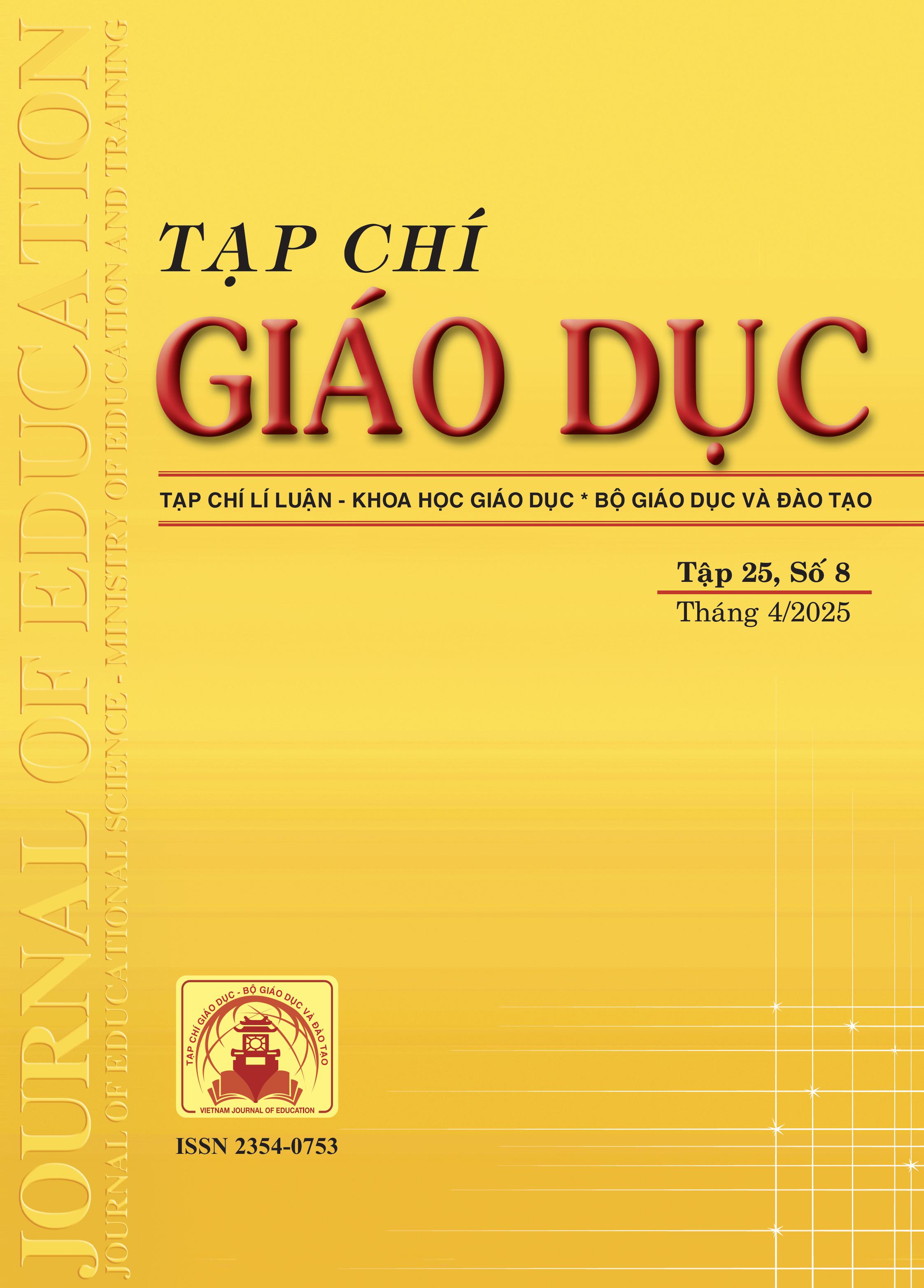Xây dựng mô hình nhiệm vụ học tập xuyên ngành trong dạy học học phần cơ sở Khoa học tự nhiên, ngành Giáo dục tiểu học
Tóm tắt
This study contributes to clarifying the transdisciplinary theory, proposing the transdisciplinary task theory, the transdisciplinary task model and the process of designing transdisciplinary tasks in teaching the Natural Science Foundation course for Primary Education majors. The transdisciplinary learning task model fully features the basic characteristics of teaching in a transdisciplinary manner to produce new knowledge and new methods that stretch beyond the boundaries of disciplines to solve practical problems. The transdisciplinary task model is the basis for building a process of designing transdisciplinary learning tasks, with three main structural components: Scientific data, Practical problems to be solved; and Hypothesis establishment. Using transdisciplinary learning tasks in teaching would help students perceive a large amount of natural science knowledge efficiently while developing the transdisciplinary capacity to meet the objectives of the 2018 general education curriculum.
Tài liệu tham khảo
Ballantine, J. A., Guo, X., & Larres, P. (2018). Can Future Managers and Business Executives be Influenced to Behave more Ethically in the Workplace? The Impact of Approaches to Learning on Business Students’ Cheating Behavior. Journal of Business Ethics, 149(1), 245-258. https://doi.org/10.1007/s10551-016-3039-4
Bùi Thế Cường (2021). Phương pháp đối thoại hộp công cụ trong nghiên cứu xuyên ngành. Tạp chí Khoa học, Trường Đại học Thủ Dầu Một, 6(55), 3-10.
Bybee, R. W. (2010). Advancing STEM Education: A 2020 Vision. Technology and Engineering Teacher, 70, 30-35.
Carpenter, D. (2005). Using learning objectives for course design and curriculum improvement. Paper presented at the 2005 Annual Conference.
Dalingwater, L. (2022). Challenges in Transdisciplinary Research. Postdigital Science and Education, 4, 671-675. https://doi.org/10.1007/s42438-022-00292-6
Ellis, R. J. (2018). Problems may cut right across the borders: Why we cannot do without interdisciplinarity. In Interdisciplinary learning and teaching in higher education. Routledge.
Hirsch Hadorn, G., Hoffmann-Riem, H., Biber-Klemm, S., Grossenbacher-Mansuy, W., Joye, D., Pohl, C., ... & Zemp, E. (2008). Handbook of transdisciplinary research. Springer.
Hoàng Phê (2003). Từ điển tiếng Việt. NXB Đã Nẵng.
Huỳnh Mộng Tuyền (2022). Đặt giả thuyết cho đề tài nghiên cứu khoa học giáo dục. Tạp chí Khoa học Giáo dục Việt Nam, 18(1), 80-85.
Jantsch, E. (1972). Inter-and transdisciplinary university: A systems approach to education and innovation. Higher Education, 1(1), 7-37.
Khoo, S.-M., Haapakoski, J., Hellstén, M., & Malone, J. (2019). Moving from interdisciplinary research to transdisciplinary educational ethics: Bridging epistemological differences in researching higher education internationalization(s). European Educational Research Journal, 18(2), 181-199. https://doi.org/10.1177/1474904118781223
Mansilla, V. B., & Duraising, E. D. (2017). Targeted Assessment of Students’ Interdisciplinary Work: An Empirically Grounded Framework Proposed. The Journal of Higher Education, 78(2), 215-237. https://doi.org/10.1080/00221546.2007.11780874
National Research Council, Division of Behavioral, Social Sciences, Board on Science Education, & Committee on a Conceptual Framework for New K-12 Science Education Standards. (2012). A framework for K-12 science education: Practices, crosscutting concepts, and core ideas. National Academies Press.
Nguyễn Thanh Nga (chủ biên), Hoàng Phước Muội, Nguyễn Đắc Thanh, Phạm Đình Văn, Trịnh Lê Hồng Phương (2020). Dạy học tích hợp - Phát triển năng lực giải quyết vấn đề thực tiễn cho học sinh trung học. NXB Đại học Sư phạm Thành phố Hồ Chí Minh.
Nicolescu, B. (2012). The Need for Transdisciplinarity in Higher Education in a Globalized World. Transdisciplinary Journal of Engineering & Science, 3, 11-18. https://doi.org/10.22545/2012/00031
Nicolescu, B. (chuyển ngữ: Bùi Thế Cường, 2019). Phương pháp luận xuyên ngành. Tạp chí Khoa học, Trường Đại học Sư phạm Thành phố Hồ Chí Minh, 3(247), 1-15.
OECD (2003). The PISA 2003 assessment framework: Mathematics, reading, science and problemsolving knowledge and skills. Paris: OECD.
Oliveira, T. M. de. (2019). Multi/inter/transdisciplinary assessment: A systemic framework proposal to evaluate graduate courses and research teams. Research Evaluation, 28(1), 23-36. https://doi.org/10.1093/reseval/rvy013
Shon, P. C. H. (2006). How College Students Cheat On In-Class Examinations: Creativity, Strain, and Techniques of Innovation. Plagiary: Cross-Disciplinary Studies in Plagiarism, Fabrication, and Falsification, 1(10), 1-20.
Van Den Heuvel-Panhuizen, M. (2005). The role of contexts in assessment problems in mathematics. For the Learning of Mathematics, 25(2), 2-23.
Võ Thị Bích Thủy, Nguyễn Thị Hằng Nga (2025). Tổ chức dạy học học phần cơ sở khoa học theo tiếp cận xuyên ngành. Tạp chí Khoa học, Trường Đại học Sư phạm Hà Nội (Khoa học giáo dục), 70(1), 164-174.
Tải xuống
Đã Xuất bản
Cách trích dẫn
Số
Chuyên mục
Giấy phép

Tác phẩm này được cấp phép theo Ghi nhận tác giả của Creative Commons Giấy phép quốc tế 4.0 .












